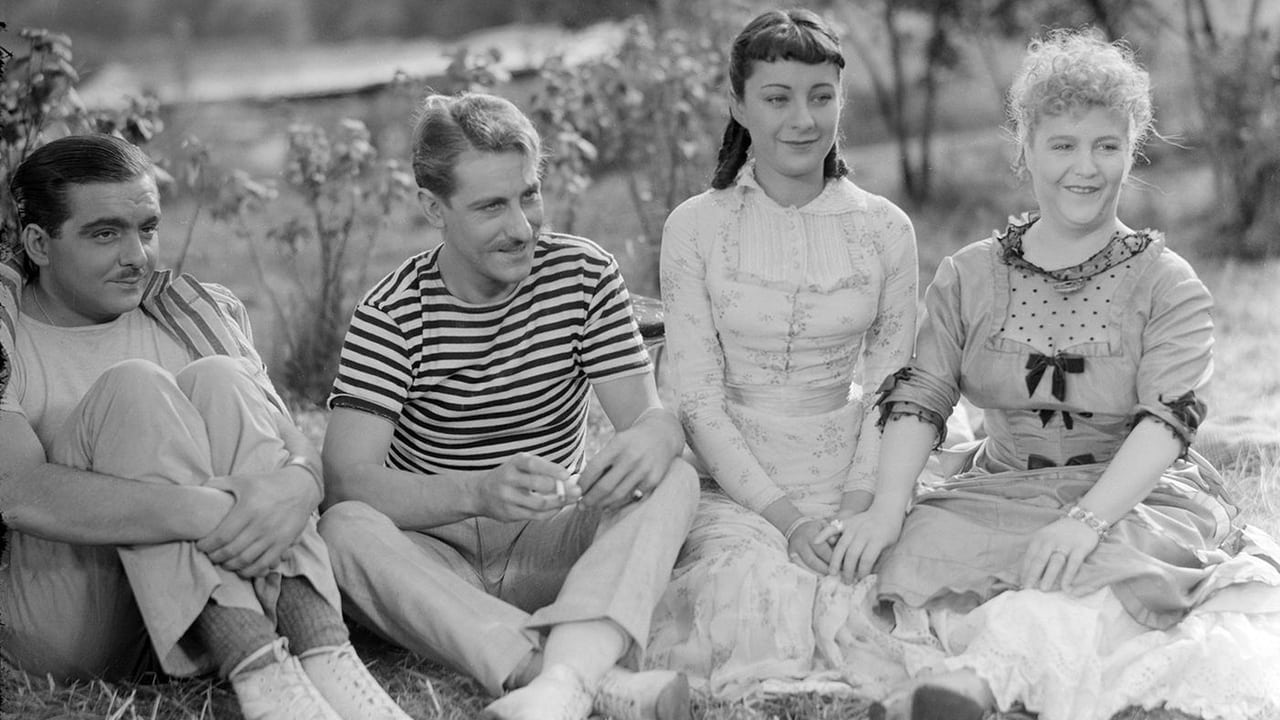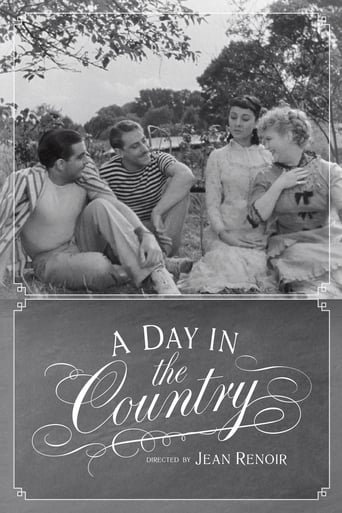

I am only giving this movie a 1 for the great cast, though I can't imagine what any of them were thinking. This movie was horrible
... View MoreI didn’t really have many expectations going into the movie (good or bad), but I actually really enjoyed it. I really liked the characters and the banter between them.
... View MoreExcellent and certainly provocative... If nothing else, the film is a real conversation starter.
... View MoreStory: It's very simple but honestly that is fine.
... View MoreUnfortunately, A Day in the Country is an incomplete film that is only approximately forty minutes long. If things had gone differently, I believe that the film would now be considered Jean Renoir's masterpiece, because within these mere fragments of a work intended to be much larger, one can see a work of genius and beauty. The characters are memorable, the music is heartfelt, the cinematography is gorgeous, and the story is marvelous. Although The River is often praised for its stunning imagery, A Day in the Country may just be the most visually appealing of Renoir's work. His lens captures the countryside with true poeticism, consuming the viewer with its gentle beauty.Across his countryside landscape, Jean Renoir paints a portrait that combines laughter with tears. Beginning as a lighthearted farce, A Day in the Country eventually morphs into a poetic drama and romantic tragedy. The final sequence is the most notable, for it is among the most powerful and unexpected uses of flashing forward in time in cinematic history. Although its full intended impact cannot be felt due to the film's length running short, there is no denying how wonderfully crafted the final scene is within itself. Even without context, one cannot help but choke up a little when witnessing such sadness.Dipped in tenderness and humor, A Day in the Country is an elegant work of art that is sadly short in length, but remains just as powerful as films three times as long despite these unfortunate circumstances.
... View MoreWell.. if you ignore the last couple minutes and final developments, it is probably a contender. IMDb lists this 80-year-old movie as a drama, but really the only drama in the first 35 out of 40 minutes was the guys deciding who's going to pick which girl. People from the city spend some time in the countryside to relax and some bachelors who live in the countryside quickly take an interest in the females. They spend a nice day in the green and I could almost smell the fresh air through my computer screen. This film was written (adapted from a Guy de Maupassant short story) and directed by Jean Renoir, son of famous painter Auguste, pretty much in the middle of his career and he also played a part in this black-and-white movie. All in all, it was a very chilly watch and the female protagonist (Sylvia Bataille) was truly stunning. I think I recommend taking a look at this one, but make sure you find subtitles if you're not fluent in French.
... View MorePlot: On a day out in the country, a city girl is pursued by two young men.Review: This was a pleasant, short piece, with little moments that almost anyone can relate to. The general setting is a city family's outing to a countryside inn. The father tries to make out he's an expert on everything they see, the mother is more concerned about ants climbing into her underwear, the grandmother falls asleep with a kitten on her lap, and the daughter plays on a swing. Two local lads immediately engage in their favourite sport – girl watching, and the girl (Sylvia Bataille) quickly attracts their interest. After vying with each other for her attention, they quieter of the two boys finds himself alone with her and they share a passionate moment.As the movie rolled by, it did not make an immediate impression as anything very special, but an unexpected bitter-sweet twist at the end helped explain why this short is held in high regard, in spite of being unfinished. Renoir had to abandon the movie because of bad weather and a commitment to another piece of work, but the pieces he'd shot were later put together to make a complete and coherent tale. It may be all the better for it, as I wouldn't have been so interested in sitting through a longer version, as good and more polished as it might have been. Very 'French' in tone, worth a look at if you get the chance.www.thebestmovieof.com
... View MorePartie de campagne (Jean Renoir, 1936) is one of the great unfinished films. Usually such projects exist in tantalising snippets because a director snuffed it before realising his vision, or failed to get a movie off the ground due to short-sighted financiers. In this case, Renoir quit because it kept raining. Admittedly it rained for much of a six-week shoot, but even so... Happily, the 40-minute Partie de campagne doesn't seem unfinished, with an intriguingly-paced three-act structure that works just fine and a heady summer atmosphere that stands as perhaps the most inspired example of its director's quiet lyricism. It's an often breathtaking pastoral film, creating a fully-realised rural world a la Tol'able David and Louisiana Story into which to throw our protagonists.Sylvia Bataille is Henriette, a Parisian girl who decamps to the countryside for the weekend with her parents, her grandmother and her fiancé. There, she and her mother (Jane Marken) encounter a prospective-family-man-cum-intense-romantic and his caddish mate, who sweep them off their feet and onto a pair of rowing boats. But this is 19th century France, and the ties that bind won't slacken just because someone's fallen in love.The film is gentle, entertaining and sometimes very funny, benefiting from superb performances by Bataille, Marken and young romeos Georges D'Arnoux and Jacques B. Brunius, a luscious musical score composed for its 1946 release and Renoir's effortless, transcendent handling of the material. Its coda is absolutely heartbreaking: the perfect wrap-up for a film that's shot through with unshakeable conviction and a tangible love of the countryside. Renoir's fondness for Bataille's expressive, elfin face is just as obvious - he would return to it later the same year in his fascinating serio-comic polemic Le crime de Monsieur Lange. A set piece here that sees her guilelessly embrace the pleasures of a swing is slight but somehow unforgettable. Elsewhere, Renoir's script matches the exalted treatment, encompassing as it does themes of nostalgia, teary joy and the essence of being.But Partie de campagne does have one - perhaps major - flaw, so bizarre as to be unintelligible. That's the presentation of the father and the fiancé, Anatole, as music hall imbeciles. The younger is particularly ridiculous, resembling a young Stan Laurel as he repeatedly squawks and wobbles his bottom lip. For that matter, the dad looks not unlike Oliver Hardy. Really odd. Perhaps Renoir, adapting Guy de Maupassant's novel, is making a satiric point about the unredeemable unsuitability of the young couple, or the ineptitude of Parisians cast adrift several miles from the big city, but it's a directorial decision that's never really justified.Still, that's the only gripe about this amazing piece of work, which largely hums with brilliance and ultimately stands shoulder-to-shoulder with La grande illusion as the director's greatest achievement.Trivia note: That's Renoir himself as the restaurateur, Poulain.
... View More